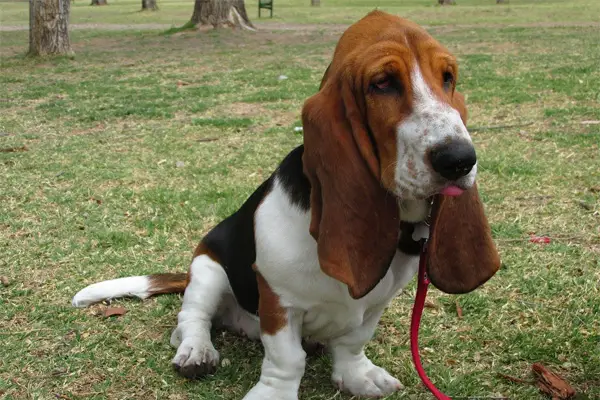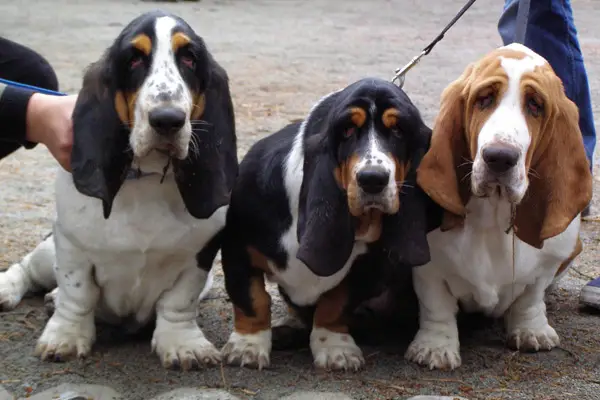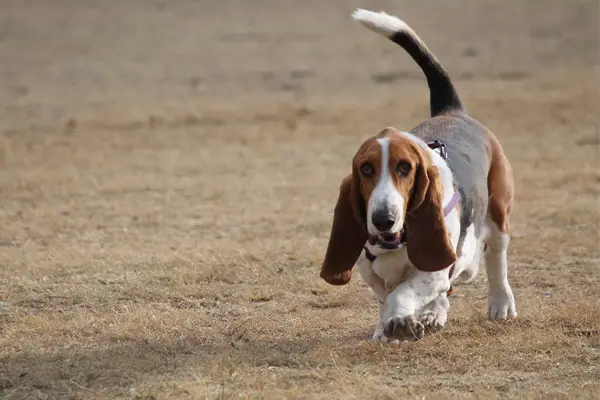Basset Hounds may look small because of their low height, but they have incredible strength and stamina that is almost on par with a big dog. Their heavy bones and muscular build make them weigh up to 40-65 pounds. The Basset Hound features a large, domed head with long ears, mournful eyes, and a wrinkled brow that makes them look like a sad clown.
Others may say that the Basset Hound is an unattractive dog breed. But, despite this appearance, their hunting skills are impressive. They make excellent companion dogs, too, and can adapt well in an indoor environment.

Basset Hound Statistics
| Dog Breed Group | Hound |
| Breed Size | Medium |
| Height | up to 15 inches |
| Weight | 40-65 pounds |
| Lifespan | 12-13 years |
Basset Hound Ratings
| Energy level | |
| Exercise needs | |
| Requires attention | |
| Playfulness | |
| Trainability | |
| Shedding | |
| Grooming | |
| Friendly with family | |
| Friendly with kids | |
| Friendly with strangers | |
| Friendly with other dogs | |
| Prey Drive |
Basset Hound History
Basset Hounds’ history can be traced as far back as the 1500s. They were of French Background, as their name came from the French word “bas,” which means “low.”
All that is known is that the breed appeared in the 16th century when badger hunting was prevalent. It was believed that these dogs have originated from the friars of the Abbey of St. Hubert. It is said that several old French breeds were crossbred to one another to create this low-scenting hound.
Their goal is to create a dog companion small/low enough to hunt rabbits. It should also have a keen sense of smell. And they succeeded in creating one. French aristocrats loved using these dogs because of their low body, a keen sense of smell, and swift moves.
Unfortunately, there is no record as to what dogs were used to create the breed.
By the late 1800s, the first Basset Hounds were finally introduced in America and England. The dog breed immediately rose into popularity, and by 1885, the American Kennel Club finally recognized the breed.

Basset Hound Temperament
Basset Hounds are known to be charming, patient, and low-key. They are one of the most good-natured and easy-going dog breeds.
As hunting dogs, Basset Hounds usually go in packs, which makes them very friendly with other dogs or animals. They have high energy, and they would undoubtedly enjoy running around. So, make sure to keep him in a fenced yard if you decide to put him off-leash.
Basset Hounds are also known for their keen sense of smell. And sometimes, once they capture a new scent, they won’t stop chasing it even if you command them to stop.
They are not the most obedient dog breed, and they have a stubborn nature. They are certainly not the easiest dog breed to train. So, I highly recommend being consistent with your training and shower him with praises. You can even give him treats, but be careful not to feed him too much.
Other than being excellent hunting dogs, Basset Hounds are exceptional family pets as well. They are known to be friendly and peaceful, even to strangers. They also get along well with children.
Though they may appear calm, Basset Hounds are alert dogs. They will bark when needed, which makes them excellent watchdogs too. Just make sure always to keep him entertained to avoid excessive howling.
Early socialization is always crucial for a dog’s good behavior. By exposing them to different things at a young age, you’re raising them to be excellent, well-rounded dogs as they grow older.
Basset Hound Care Requirements
- Nutrition: As a short dog, Basset Hounds can be prone to overfeed, which can cause obesity. So, it’s necessary to watch out for daily calorie intake and divide this into smaller meals in a day. Having a high-quality and well-balanced diet is crucial. You can choose to either feed him a commercial dog food or an all-natural diet. If you’re opting for the former, make sure that the dog food contains all the essential nutrients – protein, carbohydrates, and fats. It should also not contain any fillers, by-products, or anything that has low nutritional value. For the all-natural diet, bones and raw food diet is highly recommended. This will usually consist of 80% of raw bones and meat, which will help provide energy to your Basset Hound. You can also mix in some fruits, vegetables, or brown rice for additional nutrients. Or you can even supplement this with vitamins. Whatever option you choose, if you’re not entirely sure if what you’re doing is right, you can ask for some guidance from your vet.
- Grooming: Basset Hounds have short, smooth hair that sheds occasionally. However, regular brushing is still essential to keep their coat shiny. Plus, it’s a great way to bond with your pet. Give your Basset Hound a good brush at least once a week. You can do this daily during the shedding season to remove all loose hair and prevent it from scattering all over your floor and furniture. Baths should be done regularly too. Many people say they have more smell than most dog breeds, especially if they’ve done a lot of activities. Just make sure you use the right kind of shampoo and thoroughly clean the back of the ears. Pay attention to your dog’s nails too. Keep it trimmed as long nails can be painful. Don’t forget to clean the ears regularly, even if you’re not bathing him. This will help prevent ear infection, which is prone to a lot of dogs.
- Exercise: Although a hunting dog, the Basset Hound doesn’t require heavy exercise. They are not the active type and can certainly lie down on his couch all day long. But, if you want to keep them healthy, they need a regular but moderate exercise. Usually, this is just a few minutes of walk daily. You can also create some short activities that you can do together as well.
- Health: All Basset hounds have achondroplasia, dog dwarfism, which is responsible for their low height. However, other than this, they are also prone to more health problems. Some primary health conditions you need to watch out for are osteochondritis dissecans, gastric torsion, hip and elbow dysplasia, entropion, and von Willebrand’s Disease. Obesity and patellar luxation are also common but not as severe as the other diseases. For some of these health issues, there are tests your dog can take to detect it early. Also, try to observe your dog for any symptoms and make sure to have him checked immediately.
- Lifespan: The life expectancy of Basset Hounds is 12-13 years.

Famous Basset Hounds
- Flash: Basset Hound Sidekick of Roscoe P. Coltrane
- Pokey: Basset Hound friend of Lassie (the famous dog in the film Lassie Come Back Home)
- Droopy Dog: Classic animated Basset Hound
- Victoria: A Basset Hound elected as co-mayor of Concord, Ontario
- Hugo: The Basset Hound of Marilyn Monroe and Arthur Miller during their marriage
Fun Facts About Basset Hounds
- Basset Hounds originated from France.
- The Basset on their name means low, which refers to their size.
- They were bred to hunt a variety of animals, particularly rabbits and hares.
- They are the second best-sniffers among all dog breeds. They have over 220 million smell receptors.
- Their ears have a purpose – to bring smell directly to their face.
- They were also bred short, so they remain close to the ground for easier scent tracking.
- Basset Hounds find it hard to swim, so pay close attention to them if you’re near bodies of water.
- They all have achondroplasia (dwarfism in dogs).
- They easily get dirty.
Check Out Other Hound Dog Breeds:
Afghan Hound, American English Coonhounds, American Foxhound, Basenjis, Beagle, Black and Tan Coonhound, Bloodhound, Bluetick Coonhound, Borzois, Cirnechi dell’Etna, Dachshund, English Foxhound, Grand Basset Griffon Vendeens, Greyhound, Harrier, Ibizan Hound, Icelandic Sheepdogs, Irish Wolfhound, Norwegian Elkhound, Otterhound, Petit Basset Griffon Vendéen, Pharaoh Hounds, Plotts, Portuguese Podengo, Redbone Coonhound, Rhodesian Ridgeback, Salukis, Scottish Deerhounds, Sloughis, Treeing Walker Coonhound, Whippet
